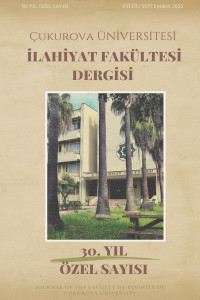Kıraatçılar ve Nahivciler’e Göre Sakin Nûnun ve Tenvînin Hükümleri
Sâkin nûn denilince, cezmli Nûn akla gelir. Tenvîn, yani iki üstün (-ً) iki esre (-ٍ) ve iki ötre (-ٌ) de ağızdan çıkan lâfız bakımından Sâkin nûn (نْ) gibi kabul edilir. Çünkü tenvîn, “ Nun gibi okumak” manasında bir tabirdir. Bu sebepten ğunne ile ilgili konularda, “Tenvîn ve sâkin nûn” terimleri daima birlikte kullanılagelmiştir. Kıraatçılara ve Nahivcilere göre Tenvîn ve sâkin nûn’un dört hali vardır: 1- İzhâr, 2- İhfâ, 3- İklâb, 4 -İdğâm.Kıraat ve Nahiv âlimleri sâkin nûnun ve tenvîni; İzhâr, İhfâ, İklâb ve İdğâm olmak üzere dört ana kısma ayırmışlardır. Tenvîn’in manası nûnlamak demektir. Bilhassa isimlerin sonuna yazı olarak değil, lafzan sıla halinde bitişen sakin nûndur. Sâkin nûn ise harekesi olmayan nûn demektir. Tenvîn telaffuz bakımında sâkin nûn demek olduğu için, sâkin nûna ait olan hükümler ona da şâmildir.
Anahtar Kelimeler:
Kıraatçılar, Nahivciler, Tenvîn, İzhâr, İhfâ, İklâb, İdğâm
Kıraatçılar ve Nahivciler’e Göre Sakin Nûnun ve Tenvînin Hükümleri
When we mention the consonant Nun we mantion Nunation, in fact. Nunation means double “an” and it gives douple “in” and double “un”. It is accepted as the consonent Nun ( ْن .(When it is pronunced. Because Nunation means “reading such as Nun”. The words “ğunne” and Nunation and consonant Nun have always been used together. According to readers of the Qur’an and Philologists there are four ways Nunation and consonant Nun. They are Explanation, Concealment, Alteration, Assimilation.When we mention the consonant Nun we mantion Nunation, in fact. Nunation means double “an” and it gives douple “in” and double “un”. It is accepted as the consonent Nun ( ْن .(When it is pronunced. Because Nunation means “reading such as Nun”. The words “ğunne” and Nunation and consonant Nun have always been used together. According to readers of the Qur’an and Philologists there are four ways Nunation and consonant Nun. They are Explanation, Concealment, Alteration, Assimilation.
Keywords:
Readers of Qur’ân, Philologists, Nunation, Explanation, Concealment, Alteration, Assimilation,
___
- Özli, M. (2009). The Consonant Nun and Nunation Rules According to Readers of the Qur’ân and Philologists, Çukurova University Journal of Faculty of Divinity 9 (1), 123-137
- Yayın Aralığı: Yılda 2 Sayı
- Başlangıç: 2001
- Yayıncı: Çukurova Üniversitesi
Sayıdaki Diğer Makaleler
Kıraatçılar ve Nahivciler’e Göre Sakin Nûnun ve Tenvînin Hükümleri
İslam Dünyasında Yenilik ve Yenilikçilik Karşıtlığının Zihniyet Kodları -Modern Türkiye Örneği-
Dinî Tutumların Oluşum, Gelişim ve Değişimi
İsmâ‘il Hakkı Bursevî’nin Vasiyet-nâme’si
Kur’ân’ın Mucizevî Korunması (9-10 Mayıs 2009-İstanbul)
Bağlamcılık'a Yönelik Bir Eleştiri
Debûsî’nin Hadisleri Anlama ve Yorumlama İlkeleri
İmam Şafii’nin Ehl-i Beyt ve İlk Halifeler ile İlgili Tasavvuru/Algısı
